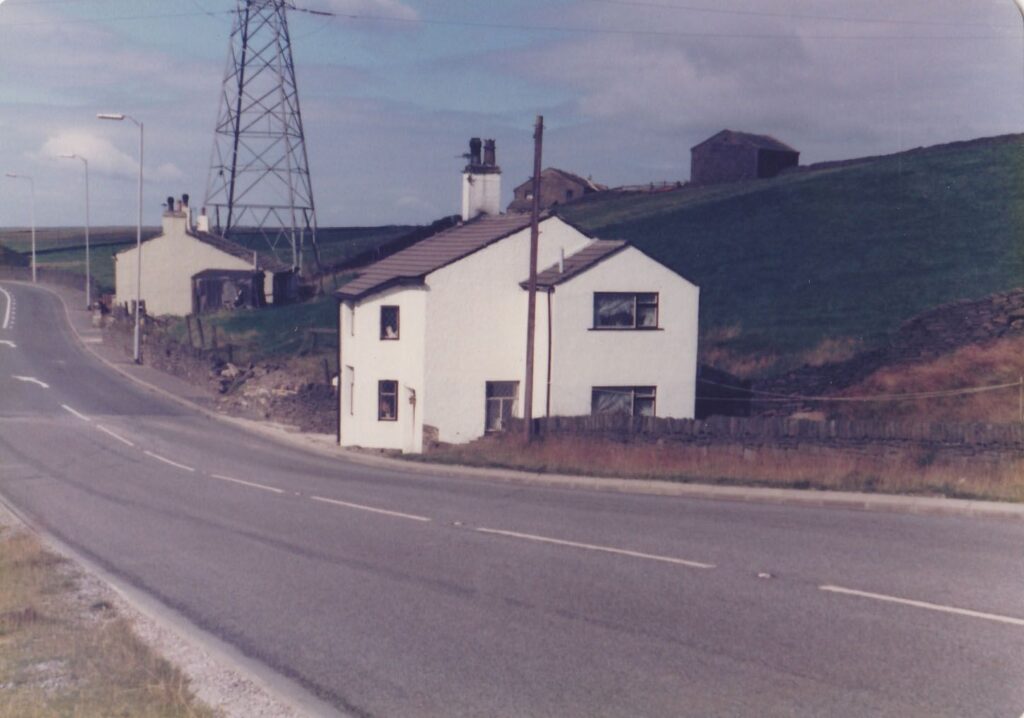Once recognized as the Bull & Dog Inn, the establishment known as The Blue Ball Inn now rests as a vacant field. A date stone bearing the initials J.G.B. and the year 1792 marks its historical significance. Remarkably, John Cropper maintained his role as the landlord for nearly three decades, from 1848 to 1877, succeeding his father James in the position. The Blue Ball gained notoriety in an 1886 issue of the Bacup Times, following a letter from a reader that recounted the tale of the Heyworth family. Known locally as Bill O’ Rogers and his sons, this notorious group of Bacup highwaymen met their fate at the gallows of Lancaster Castle in 1827.
The highwaymen had accosted the writer’s father John Ashworth and Uncle Joseph Crabtree, who had been on their way home, he wrote: It was rather late, but they got along very well until about a quarter of a mile past the toll bar, in the direction of Dulesgate on Todmorden Road, when by the strong light of the moon, they could see in the distance four men behind the fence, whom they suspected to be either poachers or robbers. They carried on until they got opposite where they stood. Being a very lonely place they became suspicious of foul play, for as they came nearer they felt sure they were robbers if not murderers, for their faces were blackened, and they had blouses or stone getters smocks on, and each of them had a bludgeon in their hand. The four miscreants, Bill O Rogers and his two sons, and son-in-law instantly and completely barred the way George and
the father abreast my uncle and Rogers and Jackson in front of my father.
The silence was broken by my father asking if they have seen any other cows going down. Rogers said no in a gruff voice, and instantly aimed a most deadly blow at the head of my father. He ducked and sprang forward, and thus escaped a violent death as he always maintained and as Jackson the approver, fully sustained at the trial. My father ran for his life, and in his own words, it was stride for stride for over a mile, until they came near to a public house called the Blue Ball fear lending him speed and the weight of the bludgeons interfering somewhat with the deadly progress of his pursuers.
He entered the Blue Ball, in breathless haste, and unfolded his frightful adventure as well as he could to the few people who were in the public house. How he had been pursued by robbers from near Sharneyford, and how narrowly he had escaped with his life. “But” continued he “ the worst I have to tell you, my brother-in-law was with me when we met the pads I holding on the road, and he turning to the left on the moor, where undoubtedly he has been most foully murdered by them”. “Do get me some help so we may know his fate, there is not a moment to loose”. Upon hearing this, five or six men who happened to be in the inn armed themselves with guns and other weapons and set out in search of my uncle. He had been pursued onto the moor by George and Jackson. George who was the most agile of the two being only about nineteen outdistanced Jackson, and was soon upon my uncle, who gallantly turned round instantly upon his assailant, and dealt him a blow with his light walking stick, breaking it on his back. By this time, Jackson came upon the scene, and their victim was laid low by a deep gash on the temple by George’s bludgeon, and laying helpless and senseless at their feet. Jackson said, “cut his throat”. They took what he had upon him, including a watch, silver pencil case, pocket knife, and about six or seven shillings in silver. They were much provoked with their small booty. When Jackson said “cut his throat” they never dreamed my father had escaped and baulked the murderers of their prey.
He had some money on him.
My uncle was found by my father and the other rescuers weltering in his own blood, more dead than alive. It should be told that George while attempting to pull the watch from my uncle’s fob broke the chain, and it had to be cut out. At that time people wore belts with two or three buckles. The knife came into contact with one of these buckles while operating upon the fob or it would have been fatal to his victim, the cut in the iron being quite perceptible. The bludgeon weighed with lead at the end was found on the spot a day or two after the event, broken in halves, its length being sixteen inches and weight approximately twenty-one ounces.
This bludgeon was a principal witness at the trial. The judge said to George “this is a deadly weapon, you had no mercy and you can expect no mercy shown”. We have the bludgeon at our house at the present time, and also the watch which was recovered with the assistance of a constable named Long George. Hundreds of people have examined them in the last half-century. Other incidents of foul crime might have been mentioned if time and space permitted.
William Ashworth Hole Bottom, Todmorden, June 23rd, 1886
